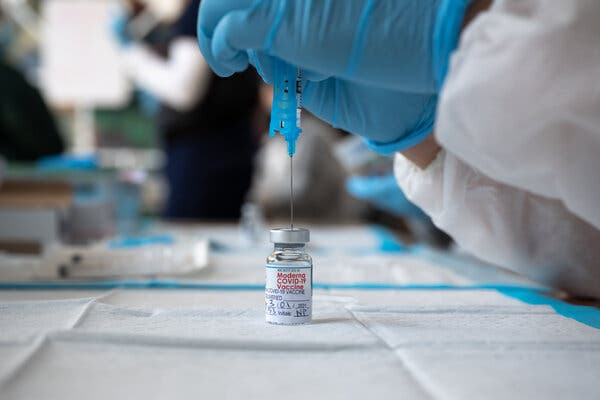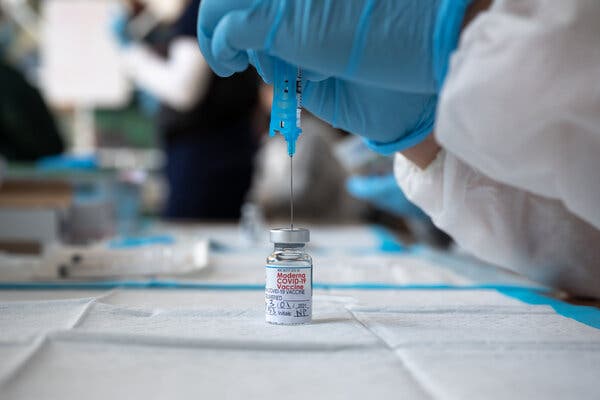Summer Camp F.A.Q.: C.D.C. Guidelines and Answers From Experts
Do counselors have to be vaccinated? Will there be singing around campfires? We asked the experts.At 8:30 one morning in March, online registration opened for the summer day camp run by my local community center. By 8:35 a.m., all the spots were taken and a wait list was building.After more than a year of living with pandemic restrictions, it’s not surprising that families are in a frenzy over in-person camp this year. In contrast to last summer, when many camps didn’t open at all or opened with strict limitations, the American Camp Association said that most overnight and day camps plan to open this summer. “There is a huge demand,” said Paul McEntire, chief operating officer of the Y.M.C.A. of the U.S.A. For many of its more than 10,000 camps, registrations are at their highest levels ever. “Camps have never been more needed,” he said.But what will summer camp actually look like this year, and what kinds of Covid-19 protocols will be required? Will kids be able to have fun and stay safe? To find out, we scoured the updated guidance from the Centers for Disease Control and Prevention and spoke with three public health experts who are working with camps to develop rigorous safety protocols, as well as with two camp executives.First off, can camps even be run safely?While just 18 percent of overnight camps, and 60 percent of day camps, ran in-person last year, according to the A.C.A., camp and health officials were still able to learn quite a bit about the kinds of practices that did — and didn’t — keep campers and employees safe.Between June 17 and 27, for instance, nearly half of the 597 campers, staff members and trainees at one overnight camp in Georgia tested positive for Covid-19 after an outbreak there caused the camp to close. According to a later C.D.C. report, health officials learned that the camp had not implemented certain safety protocols, like requiring masks for campers or opening windows and doors for ventilation; the camp also allowed “daily vigorous singing and cheering,” the report said.The experience taught camps “what you don’t want to do,” said Dr. Dipesh Navsaria, a pediatrician at the University of Wisconsin-Madison School of Medicine and Public Health who has been working to develop Covid-19 protocols for camps, including one in Wisconsin.But there were also signs that camps could be run safely. Between June 15 and Aug. 16, four overnight camps in Maine had just three positive cases out of 1,022 campers and staff members, because “they followed a multilayered approach, which is generally recognized as the best way to handle any aspect of this pandemic — distancing, outdoors, masking, hand hygiene,” Dr. Navsaria said. One study published this month also found that among 54 Y.M.C.A. day camps in North Carolina, which followed similar protocols, few experienced Covid-19 infections.“If a parent asked me, ‘Can you guarantee my child won’t get Covid?’ Well, no,” Dr. Navsaria added. But, “we made the decision that opening this year was not only safe, but really important to the mental, social and emotional health of the children that we serve.”What kinds of safety protocols will be in place this year?On April 24, the C.D.C. released updated and detailed guidance for both day and overnight summer camps, which emphasized a few basic principles. It called for outdoor, masked and distanced activities whenever possible; ventilation and reduced capacity in poorly ventilated or indoor areas; and a strong recommendation for vaccination of any employees and campers who are eligible (though camps will probably not require staff members to be vaccinated, Mr. McEntire, of the Y.M.C.A., said). It did not recommend limiting how many people can attend camp overall.For day camps, the C.D.C. said that children 2 and up should wear masks at all times except when eating, drinking, swimming or napping, and should be broken into small groups that interact only with each other. All campers must stay three feet from others in their cohort (six feet when eating or drinking), and six feet from everyone else (including their own counselors). The guidelines also recommend daily symptom checks for campers and staff, and periodic Covid-19 testing for campers, if tests are available. Employees should be tested weekly if they interact with multiple camper groups.If your child is attending an overnight camp, the C.D.C. advised that anyone who is eligible to receive a Covid vaccine should get one before they arrive, ideally receiving their final shot at least two weeks before. Unvaccinated attendees should try to practice Covid-19 safety measures — like avoiding unnecessary travel, physical distancing and wearing masks in public — as much as possible for two weeks before overnight camp begins, and they should take a Covid-19 test one to three days before they arrive.Once at camp, the C.D.C. recommended breaking campers into groups by cabin, as well as daily symptom checks and periodic testing. Campers will only need to wear masks and physical distance around those not in their bunks.Keep in mind that the federal guidance is meant to supplement, not replace, state and local guidelines. So some states may choose not to follow it, said Tom Rosenberg, president and chief executive of the A.C.A. Texas’ overnight camp guidelines, for instance, do not require camps to screen campers or the staff for Covid-19 before or during camp (though they do recommend testing if a camper or staff member becomes ill during their stay). And some overnight camps will allow campers from different groups to intermingle over time, if local guidelines allow it and there have been no cases, Mr. Rosenberg said.State guidelines may also change between now and when camp starts, said Dr. Lucy McBride, a physician in Washington, D.C., who is advising an overnight camp in Maine. “The landscape is changing enormously,” she said. So parents may want to check camp protocols close to when their kids will attend to confirm which procedures will be in place.Campers who are at high risk for coronavirus complications (or whose family members are) may want to be even more stringent with risk mitigation and should be sure to get vaccinated as soon as they’re eligible, Dr. McBride added. Camps may even advise some families that they would be better off not sending their kids to camp at all; high-risk families may want to consult with their doctors. Some camps for kids with medical conditions — such as camps run by the Muscular Dystrophy Association and the American Diabetes Association — will be run virtually again this year for safety reasons.How will beloved camp activities — campfires, field trips, singalongs — differ from those in prepandemic years?Some camp traditions may not make an appearance this year. “We’re not going to have the loud, raucous dining hall filled with incomprehensible yelling,” said Dr. Daniel Griffin, an infectious disease physician at Columbia University who is advising a handful of camps this summer. (Campers may still sing and chant, just outdoors.) Parents probably won’t be able to visit, or even step foot inside cabins at drop-off, and staff members may not be allowed to leave camp premises during breaks.Camp activities that involve cabins competing against each other, like the popular Color War competitions, may not happen this year, Dr. Navsaria added.Other camp activities may be allowed, but modified. For instance, camps probably won’t allow kids from different cohorts to mingle during electives like dance or archery. Evening campfires might still take place, but campers may be required to sit with their cohorts and six feet away from other groups. Camp performances will still happen, but they will most likely be held outside. And campers may still play some outdoor sports, but the C.D.C. advised against indoor sports as well as close-contact sports, like wrestling and basketball, even if done outside.The C.D.C. has also advised camps to avoid day trips to places like amusement parks or movie theaters that would put attendees in close contact with the public.What happens if my kid gets sick?Camp policies may vary, but if your child is in day camp and develops symptoms of (or tests positive for) Covid-19, the camp will probably isolate the child from other campers and call you to come pick her up. If your child is positive, she will most likely be able to return to camp after 10 days, provided she has no fever and her symptoms are improving. If your child is exposed to Covid-19 at camp — or if you or someone else in your household (or another close contact) contracts Covid-19 — your child may be asked to stay home and quarantine for up to 14 days.If your child is at an overnight camp and develops symptoms of Covid-19, the staff should immediately isolate and test her. If she tests positive, they will most likely move her to a dedicated facility with any other infected campers, under the care of medical providers. The staff will probably call you and let you decide if you want to pick her up or let her stay at camp until she has recovered. If your child is exposed to Covid-19 at camp, her group should also be quarantined for up to 14 days, monitored for symptoms, and may be tested regularly, though they should still be able to do some limited sports and activities as a group.If kids go home because of Covid-19, or if camps have to close because of an outbreak, Mr. McEntire said that most Y.M.C.A. day and overnight camps plan to provide prorated refunds. It’s wise to ask camps in advance about their refund policies.If this all seems complicated, it is — but experts say that camps need to be run carefully in order to keep everyone safe. And despite the rules and regulations, campers can still have plenty of fun. “Kids can have a joyous, immersive summer experience,” Mr. Rosenberg said, as long as the camps do it “in a very structured, smart way.”Melinda Wenner Moyer is the author of a forthcoming book on science-based parenting and writes a free parenting newsletter.
Read more →


